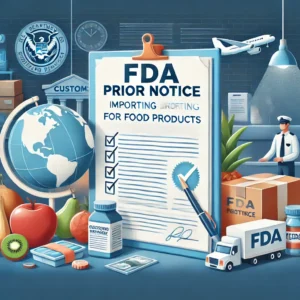
FDA Prior Notice is a critical requirement for anyone involved in importing food products into the United States. This notification must be submitted to the FDA before food arrives at the U.S. border, ensuring compliance with regulations and facilitating smoother customs processes. Understanding the ins and outs of prior notice can help importers avoid costly delays and penalties.
Navigating the FDA’s requirements can be complex, especially for new importers. It is essential to grasp the details of what information must be included, the deadlines for submission, and the potential consequences of non-compliance. Each aspect plays a significant role in maintaining the integrity of food safety and international trade.
Keeping informed about the FDA prior notice process can save time and resources for businesses. By knowing what to expect and how to prepare, importers can streamline their operations and focus on growing their business without unnecessary interruptions.
Understanding FDA Prior Notice
FDA Prior Notice is a crucial requirement for the importation of food products into the United States. It ensures the safety and compliance of these products with regulatory standards.
Definition and Purpose
FDA Prior Notice is a formal notification that importers must submit to the Food and Drug Administration (FDA) before food products arrive in the U.S. This requirement applies to both commercial and non-commercial shipments.
The main purpose of Prior Notice is to give the FDA advance knowledge of incoming shipments. It allows the agency to assess and address potential risks associated with food imports. Failure to submit Prior Notice can result in delays, detainment, or even refusal of entry for the shipment.
Legal Framework
The legal basis for FDA Prior Notice is found in the Bioterrorism Act of 2002, which mandates that the FDA establish regulations for notifying them of food imports. It requires all food products intended for human or animal consumption to be reported.
Regulations regarding Prior Notice are codified under Title 21 of the Code of Federal Regulations (CFR). Importers must comply with these regulations to avoid penalties or refusals at the U.S. border. Enforcement mechanisms include inspections at ports of entry, emphasizing the importance of compliance.
Scope and Applicability
FDA Prior Notice applies to a wide range of food products, including packaged goods, bulk products, and those that are imported for personal use. It includes items such as fruits, vegetables, seafood, and livestock products.
Certain exemptions exist, such as shipments that are transiting through the U.S. without being consumed here. Additionally, foods that are not subject to regulation by the FDA, such as certain beverages, might also be excluded. Importers should be aware of these nuances to ensure compliance with the Prior Notice requirement.
Compliance Procedures
Understanding the compliance procedures for FDA prior notice is essential for meeting regulatory requirements. Key areas include the submission process, required information, deadlines, and potential enforcement actions.
Submission Process
The submission process for FDA prior notice involves electronic filing before food shipments arrive in the United States. Importers must submit prior notice through the FDA’s Prior Notice System Interface (PNSI), Customs and Border Protection (CBP), or a third-party filer.
Information must be complete and accurate. The submission can be made up to 15 days before the anticipated arrival of the shipment. Knowing how to navigate the PNSI system can streamline this process, ensuring compliance with FDA regulations.
Required Information
When submitting FDA prior notice, specific information is mandatory. This includes the identity of the product, manufacturer details, shipping information, and the importer’s contact information.
Important details such as product description, quantity, and any associated FDA regulations must also be provided. Failure to include all required information can result in delays or rejection of the shipment. Checklists can assist importers in gathering the necessary data.
Deadlines and Timelines
Timelines for submission of the FDA prior notice are critical. The notice must be filed at least two hours before a food product arrives at a U.S. port via land or air.
For sea shipments, the submission must be made at least four hours prior to arrival. Understanding these deadlines ensures compliance and facilitates smooth processing through customs.
Enforcement and Penalties
Failure to comply with FDA prior notice requirements can lead to severe penalties. Non-compliance may result in the refusal of entry for the shipment or even destruction of the goods.
Fines can also be imposed on importers who do not adhere to regulations. It is crucial for businesses to stay informed about enforcement actions to mitigate risks associated with non-compliance.
Vaishno Devi Helicopter Booking Price: A Complete Guide to Costs and Options
Vaishno Devi, located in the Trikuta Mountains of Jammu and Kashmir, is one of the most re…